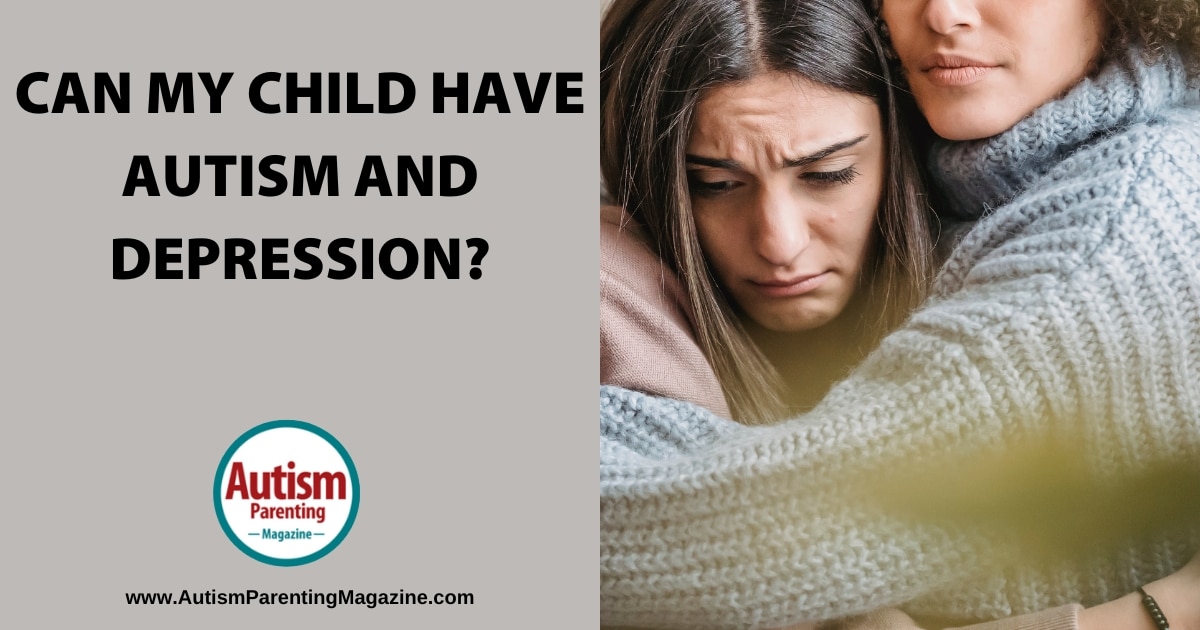As a parent, seeing your child battle depression can be one of the most difficult things to do. You want to help them through it and see brighter days ahead, no matter how bleak things may look at the time. But what about children with autism? Can a child have autism and depression?

The simple answer is yes. Research has determined that autistic individuals are four times more likely to experience depression than the general population. At last check, depression affects nearly 7% of American adults. Still, those numbers go up to 26% for those on the autism spectrum.
Unfortunately, it’s tough to recognize and treat depression in individuals with autism. But there are ways to help your child with depression and autism.
How Is Autism Different From Depression?
Depressive disorders often present similar symptoms to autism spectrum disorder. According to the Centers for Disease Control and Prevention, symptoms of depression include:
- Social withdrawal
- Changes in eating patterns
- Sleep Disturbances
- Inattentiveness
- Guilt
- Self-harm
You may have noticed several similarities to autism symptoms. Still, the reasoning behind those symptoms differs depending on whether the root cause is autism or depression.
For example, autistic children may not like social situations at all. At the same time, depressed individuals may experience social withdrawal due to feelings of sadness. Both can affect eating patterns and sleep patterns. Both depression and autism can lead to inattentiveness. And sadly, both can lead to self-injury.
How Does a Child On The Spectrum Experience Depression?
Research into signs of depression and people with autism has shown a few signs to tell if your child’s behavior is more than autism spectrum disorder. During studies, two patients with autism, who normally didn’t experience emotional awareness, cried for the first time. That helped the physicians to issue a depression diagnosis.
In other cases, it was noted that patients started neglecting personal hygiene not long before being diagnosed with depression. There have also been cases where children with autism spectrum disorder started expressing themselves in increasingly morbid writings and drawings. These are viewed as early warning signs of depression.
Treatment For Depression in Autism
There are several treatment options for depression, but discussing all possible treatments with your child’s physician and mental health professionals is important. Treatments include:
- Medications
- Talk therapy
- Cognitive behavioral therapy
- Mindfulness therapy

Medications
Medication is the most controversial way of treating depression in autistic people because of the potential for side effects. Medications can lead to impulsive and irritable behaviors, sleep disturbance, or suicidal thoughts. The problem is those are all symptoms of depression, so it can be difficult to determine if it’s depression or medication that is causing those symptoms. Side effects from medication have also been known to take a toll on mental health.
Talk Therapy
Counseling can be an effective treatment for neurotypical people battling depression. Still, it can sometimes fall short when serving those with autism. Counseling can improve the mood of those willing to participate. Still, the social setting of counseling can make some on the autism spectrum not want to participate. Even in a one-on-one situation, if the person isn’t familiar with the therapist, someone on the autism spectrum may be unwilling to talk.
Cognitive Behavioral Therapy
In cognitive behavioral therapy, the therapist tries to help the patient change unhelpful behaviors and thoughts. The therapy helps identify the patient’s thoughts and conceptions about an event and evaluate the consequences of the patient’s behavior connected to those thoughts and conceptions. Then, the therapist monitors those behaviors and helps the patient change them over time.
One study in Australia used this therapy to help decrease symptoms of depression and stress in children and teens. Study participants learned how they perceived a situation that affected their emotions and thoughts. This allowed them to change their perceptions and relieve some of the stress causing the depression.
Click
here to find out more
Mindfulness Therapy
The Netherlands has adopted mindfulness therapy to help autistic adults, and children fight feelings of depression. In the study, 20 adults were taught to view their present experiences non-judgmentally. After practicing breathing exercises, the therapy group experienced a drop in symptoms of depression and anxiety compared to another group of autistic adults that received no therapy.
Unfortunately, with both cognitive behavioral therapy and mindfulness therapy, neither study included people with an intellectual disability or limited speech. Right now, it’s not clear if these therapies could help those people.
In Conclusion
Depression can weigh heavily on a person’s mental health and lead to suicidal thoughts. Many can experience persistent feelings of hopelessness and physical symptoms. Support groups are available in almost every country in the world for those seeking support. If you are experiencing symptoms, please seek help. If you can recognize signs of depression in your autistic child, please try to get them to help. Yes, there is difficulty identifying depression in those on the spectrum because of the common symptoms, but they deserve our help.
The post Can My Child Have Autism and Depression? appeared first on Autism Parenting Magazine.
Get a FREE issue of Autism Parenting Magazine at https://www.autismparentingmagazine.com/freegift/
This content was originally published here.
